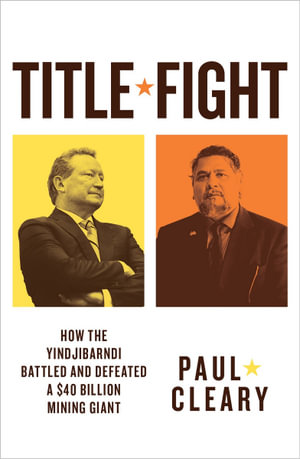Title fight: How the Yindjibarndi battled and defeated a mining giant by Paul Cleary

Cleary’s book is a detailed description of the incredibly protracted process of negotiation and litigation between the powerful Fortescue Metals Group and the Yindjibarndi people over access to their country for mining interests. Central to the story is the way the white dominant culture assumed that it knew best how to compensate the traditional owners, with the idea of providing training and jobs in the industry it created, practical intervention, rather than royalties or compensation to the Indigenous owners who presumably might squander the wealth unwisely. It might sound good, but at the heart is the idea of ‘we know best’, a complete disrespect for the knowledge, integrity and decisions of the Aboriginal people. Even more than that, the FMG company ruthlessly sought to have unfettered access to the land, offering only minimal compensation, exploiting differences between groups, orchestrating events to their advantage, relentlessly engaging in litigation, and destroying heritage sites in their path.
However led by Michael Woodley, the Yindjibarndi people stood their ground. Under the United Nations Declaration on the Rights of Indigenous Peoples, Indigenous people have the right to self-determination, to freely determine their political status and freely pursue their economic, social and cultural development. The group persisted through thirteen years of legal battles with the mining giant, to achieve recognition of their ongoing spiritual connection and responsibility for their country. It is a David and Goliath story, and while David slays the giant, the story exposes the inequalities between mining companies and native title groups, a power imbalance that continues today and is desperately in need of reform.
I would put this book alongside Maralinga by Garry Hiskey, as another important historical record of the ultimately successful win by an Aboriginal group, despite the incredibly aggressive legal assault they endured. Michael Woodley stands out as a calm and persistant leader of his people, and fortunately the Yindjibarndi people prevailed in the end. That it should have been such a long and costly process shows the many failings of our legal system to support and respect our Indigenous people. For those interested in Aboriginal culture and native title law, this is another essential read.
Themes: Non-fiction, Mining, Native title, Aboriginal land rights.
Helen Eddy